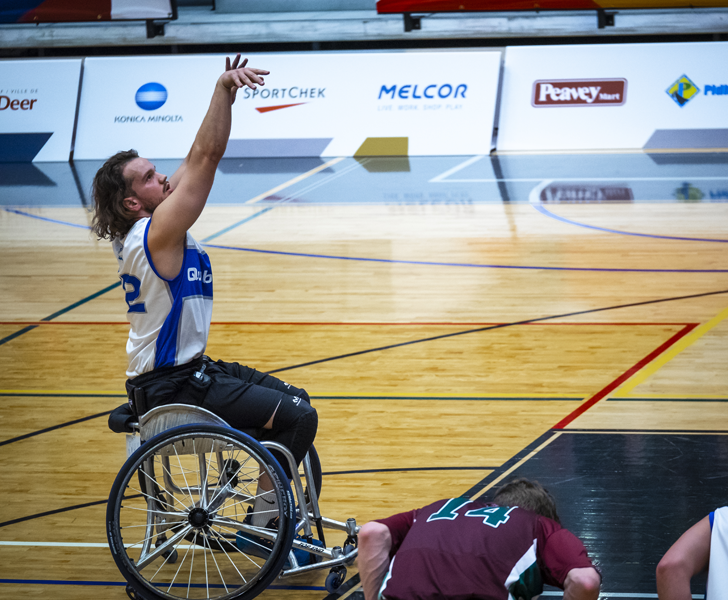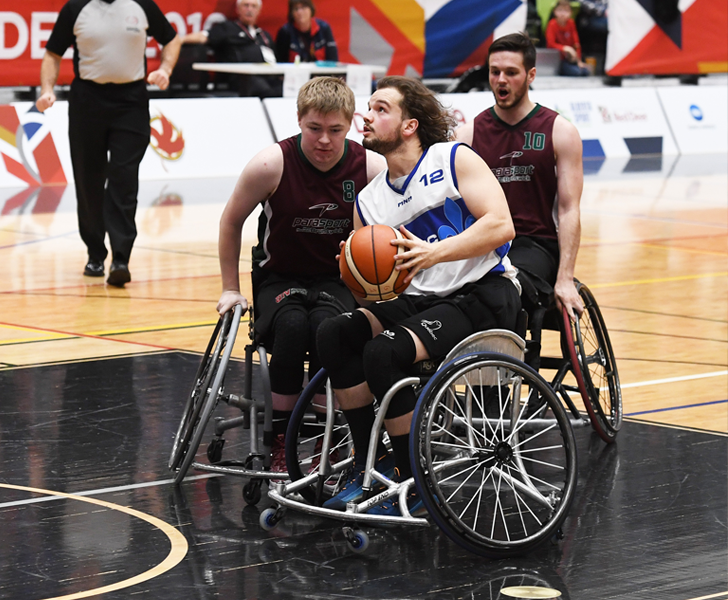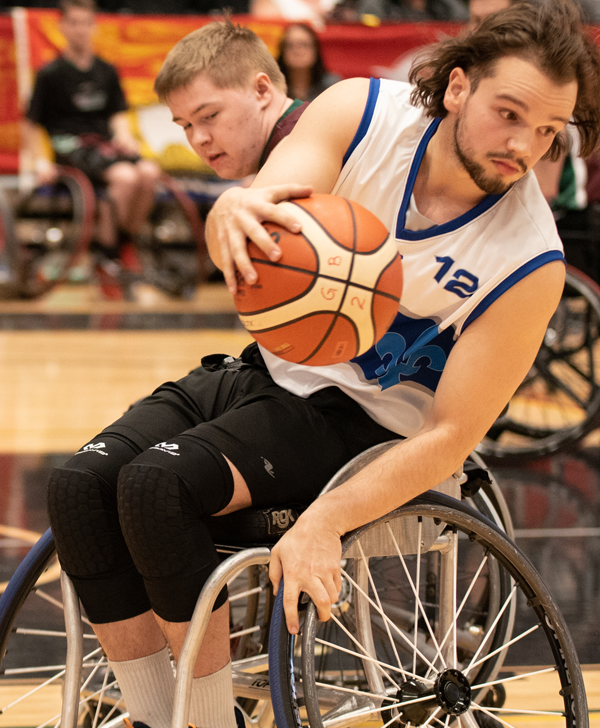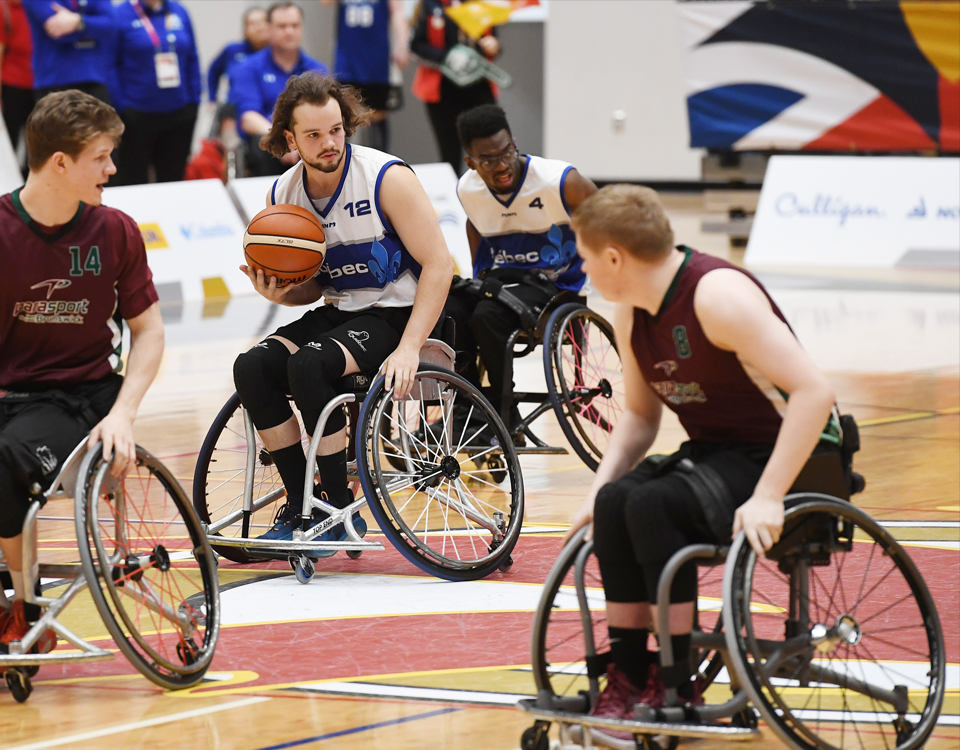Wheelchair basketball and how it has shaped my career - Benjamin Palmer
March is National Engineering Month in Canada, and what better way to celebrate it than by introducing you to one of our talented wheelchair engineers!
March is National Engineering Month in Canada, and what better way to celebrate it than by introducing you to one of our talented wheelchair engineers!
Meet Benjamin Palmer, a passionate engineer, avid wheelchair basketball player, and a fantastic teammate with a great sense of humor.
Benjamin has been a part of the Motion Composites family since 2018, when he applied to become an intern for our engineering department. Today, he is a Product Engineer for Motion Composites brand. Benjamin is a part of the Research and Development Team, which means he is one of the people in charge of designing, testing, developing, and improving our products.
Benjamin is unique. Although he does not have a disability that requires him to use a wheelchair, he is a pro when it comes to wheelchair basketball. He has been surrounded by and has been an ally of the wheelchair community since he was young. This gives him a unique perspective and understanding of the needs and struggles that wheelchair users have to face every day.
We wanted to get together with Benjamin and discuss his career as a wheelchair engineer for Motion Composites and how his passion for wheelchair basketball has helped shape it.
Benjamin Palmer: That’s a funny question, and it is one that I get asked often. As a fully-abled person, if I would arrive somewhere and say that I play soccer, nobody would even question me about it. Still, the fact that I am playing a sport that requires me to be sitting in a wheelchair always seems to interest a lot of people.
The reason why I started is because my dad had a friend who was in a wheelchair, and my dad just started playing because he wanted to play basketball with his friend.
It’s a part of my family’s history. My dad had his wheelchair that he used to play wheelchair basketball, and I sat on it and rolled around the house ever since I was a toddler. It just sparked that curiosity in me. That’s how my brother and I got introduced to this sport, and we never stopped.
I mean it when I say that it is a part of my family’s history. Wheelchair basketball has influenced not just my career but also my brothers’ and dads' lives. My dad, who had just retired, was working for the “Défi Sportif,” which is a multi-sport event for disabled athletes held every year in Montreal (like the Paralympics). My brother is one of the coaching staff of wheelchair basketball for Team Canada. I love that this passion that we share for wheelchair basketball has shaped our careers in different ways.

BP: Yes, the biggest championship that I participated in was the “Canada Games” in 2015 and 2019, where the provinces competed against each other. I also compete every year in the Canadian Championships.
I am pretty good (laughs), but the uniqueness of my situation is that because I don’t have any disability, I cannot go further than that. For example, I cannot be a part of the Paralympic Team (Team Canada), but sometimes we train with them, which is pretty cool!
BP: Yes, so the way it works is that each player has a classification. Depending on your type of disability and how much it limits you, it is based on points. It ranges between 1 to 4.5 points. If you are fully-abled you are immediately classified as 4.5, and the more that your disability limits you, the lower the points. And the 5 players on the court cannot surpass 15 points total.
My club is kind of a mix; there are some other people who, like me, are also fully-abled, and there are some others who are wheelchair users who have a disability.

BP: I have always been a “hands-on” type person who loves to know how things work and who likes to build things. When I was young, I loved watching my godfather (who is an engineer and also a “hands-on”person). Watching him motivated me to follow in his footsteps – so I went into engineering.
BP: You know, it’s funny because I never made the connection between engineering and wheelchairs until I took a health class during my program. It was eye-opening! Right after that, I decided to apply to Motion Composites for my internship at the beginning of 2018 and was picked.
I arrived at Motion Composites because I wanted to explore how wheelchairs are made and the engineering behind them. What I discovered was that it was a cool company that shared the same values as me. I fell in love with the team and the way that the team was working, so that made me want to stay.
One of the values of Motion Composites is to “be passionate about helping others.” This is one of the main values that I share with this company and one of the reasons I became an engineer in the first place. I wanted to design products that would ultimately improve people's quality of life and make their day-to-day lives easier. Becoming a wheelchair engineer was just a natural step for me to make in that direction, and I am more than happy with my decision.
BP: This is a great question; I think it has been an influence. I believe that it has made me a better wheelchair engineer since I can see the day-to-day of wheelchair users more closely. Of course, this is not the reality of every single wheelchair user. The people that I have met through wheelchair basketball are active wheelchair users, but I believe that seeing them in their basketball wheelchairs and their day-to-day wheelchairs (which are mainly Motion Composites wheelchairs, by the way) allows me to see their struggles, see things that we can improve, and helps me think about what we can do to make their life easier.
This understanding of the reality of wheelchair users gives me a unique view of things and ultimately allows me to contribute to creating better products.
Some other aspects are a bit more technical, but wheelchair basketball has helped me in my career as a wheelchair engineer. When I started getting interested in becoming a wheelchair engineer, I discovered that many concepts were not foreign to me. I understood, for example, what camber was and how wheelchair users benefit from it. I also knew the different parts of the wheelchair, so it gave me some insights into the technical aspects.

BP: Yes, I frequently suggest to my teammates that they participate in short surveys to help me better understand the needs of the wheelchair community. Gathering feedback prior to starting a project has proven to be helpful for us in the past, and I am confident that it will continue to be a valuable practice for future projects. My colleagues have been pleased with the results thus far (laughs)."
I think it’s an advantage I have as an employee of Motion Composites to be immersed in the wheelchair community like this. I involve my wheelchair-user friends in the projects we work on as often as possible. It makes our products better for the wheelchair community, and that’s the ultimate goal, right?
BP: For those interested in becoming a wheelchair engineer, I recommend being open-minded and listening closely to the needs of wheelchair users. Our goal is to create products that are designed specifically for them, so it's important to understand their unique challenges and perspectives.
For those interested in trying wheelchair basketball, my advice is to have fun and not be afraid to give it a go. There are many opportunities to try the sport, and it's a great way to connect with the wheelchair community and learn more about their needs and experiences.
